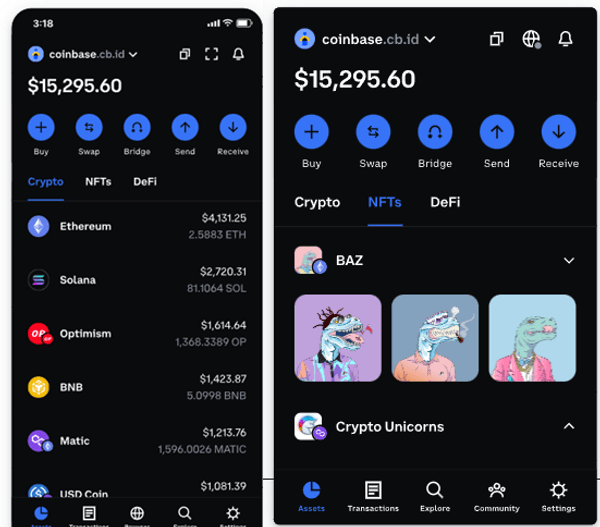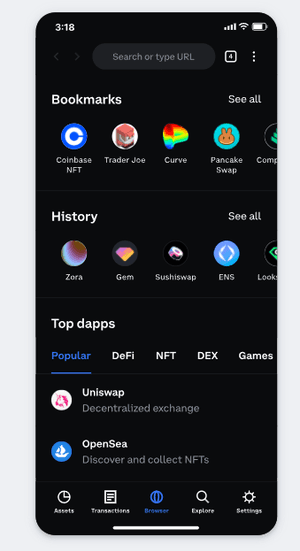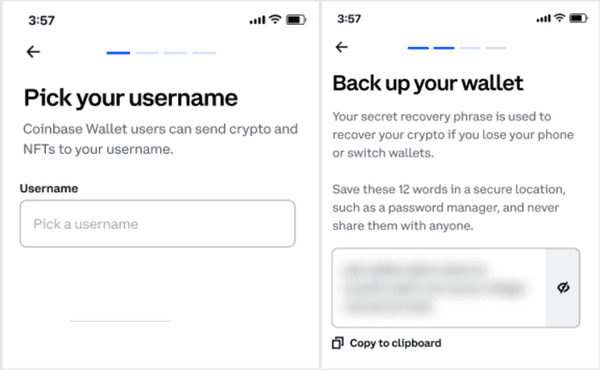Coinbase Wallet Review

Today, the world of crypto is highly accessible—nearly anyone can try their hand at e-money trading, as it is one of the most popular trends in digital payments today. However, the primary aspect investors look for in a digital currency landscape is seamless asset management and robust security. This is where Coinbase Wallet steps in as a true game-changer.
Coinbase Wallet is a self-custody digital cryptocurrency wallet offered by a similarly named brokerage platform, which is one of the largest and most reputable U.S.-based crypto exchanges. Unlike Coinbase.com, which initially serves as a platform for buying, selling, and trading cryptocurrencies, Coinbase Wallet focuses on digital asset storage and management. It enables users to interact with their funds directly from their mobile devices.
In this Coinbase Wallet review, we’ll walk you through its features, usability, security measures, and overall performance to help you determine whether it’s the right fit for your crypto journey.
Coinbase Wallet Basics
What is a Coinbase Wallet? Let’s kick off this Coinbase crypto wallet review by unpacking the concept of this financial tool and looking into its functionality.
First and foremost, Coinbase Wallet is a self-custody or self-hosted wallet. It means you’ll maintain full control over your private keys, with no custodian for your funds, and retain complete ownership and autonomy of your crypto assets. All this increases the popularity of Coinbase and makes it almost the best wallet for crypto among users.
This wallet supports over 100,000 digital holdings, including a wide range of cryptocurrencies such as Bitcoin, Ethereum, Litecoin, Solana, Dogecoin, tokens, and NFTs. This diverse range of support allows users to store and manage a wide variety of holdings within a single application, ensuring peace of mind and lending a feeling of confidence, which is especially important for crypto enthusiasts and newcomers.

Featuring a built-in decentralized application (DApp) browser, Coinbase Wallet operates as a decentralized solution in alignment with blockchain principles. As such, it provides users with access to a wide range of decentralized services and protocols, including decentralized exchanges, games, and financial applications, DeFi liquidity pools, and DAO projects, allowing users to dip their toes into the broader blockchain ecosystem.

Did you know that different types of cryptocurrency can have both advantages and disadvantages?
Unlike the Coinbase.com platform, signing up for Coinbase Wallet doesn’t require an email, bank account, or Coinbase.com account. Simply create a username and recovery phrase, and you’re good to go. More than that, you can even import an existing wallet from another provider, consolidating your digital transactions in one place.

This allows storing, sending, and receiving cryptocurrencies with ease. Users can transfer funds to other wallets by scanning QR codes or manually entering recipient addresses. It is also available in over 130 countries for purchasing crypto. For this, though, you'll need to link a Coinbase account or a third-party account (availability varies by region).
Coinbase Wallet Security Profile

As a noncustodial solution, Coinbase Wallet ensures that you have access only to your private keys and funds. With no need for specifying your personal data, it provides the ultimate level of privacy and autonomy. You can even decide on the searchability of your profile.
How safe is Coinbase Wallet, then? When it comes to security, the good news is that a high level of autonomy ensures that your digital assets are secure even in the event of a hacking attack on the exchange. Thanks to its decentralized infrastructure, the risk of single points of failure is significantly reduced, which enhances its resilience against potential cyberattacks.
On the user side, Coinbase Wallet offers two-factor authentication during the setup process, which includes biometrics and passcode for an added layer of protection. On the app’s end, Coinbase Wallet employs encryption protocols to secure communication between the app and external servers. It safeguards sensitive data, such as private keys and transaction details from being intercepted or accessed by malicious actors.
To add more, if your device is lost or stolen, Coinbase Wallet offers a secure backup and recovery mechanism. Upon setting up the wallet, you’ll be prompted to create a 12-word recovery phrase, which will allow you to restore access to your funds on a new device.
So, is Coinbase Wallet safe? With its solid built-in security features, you can be confident that your wallet and funds are well protected. However, there is one important caveat. Your in-app security largely depends on your personal security information. If you lose or forget your password or recovery phrase, you won’t be able to access your crypto. Unlike traditional exchange platforms, Coinbase Wallet cannot restore private data. So, be sure to back up your recovery phrase using a password manager, cloud services, or in a secure physical location.
Coinbase Wallet Rates and Client Service

Is Coinbase Wallet free? Downloading and using the app is completely free of charge. Likewise, transferring crypto between the wallet and Coinbas.com incurs no fees. However, Coinbase Wallet charges network transaction fees (also known as miner fees) apply when sending cryptocurrencies from the wallet to external addresses. These fees depend on factors like network congestion, blockchain network fees, and the specific cryptocurrency being transferred. Users have the flexibility to customize transaction fees based on their preferences for transaction speed or cost-effectiveness.
When it comes to swapping and staking, Coinbase does not charge direct fees either. However, swapping incurs DEX aggregator fees, and staking comes with the Coinbase commission on the rewards. A standard commission rate on the rewards is 35%. Any fees associated with transactions will be clearly displayed during the completion stage.
Regarding customer support, Coinbase Wallet provides access to a comprehensive help center and knowledge base, which covers frequently asked questions, troubleshooting guides, and tutorials on using the wallet’s features. Topics range from account security and wallet management to transaction processing and platform policies. At the same time, live customer support for Coinbase Wallet is limited since the live chat feature is only available to platform users.
For inexperienced users, we have separate articles on crypto investing for beginners and what is bitcoin mining.
Coinbase Wallet: Pros and Cons

Is Coinbase a good wallet option? Let’s break it down by comparing the Coinbase pros and cons.
Coinbase Wallet Pros
- Intuitive and user-friendly interface, making Coinbase Wallet easy to get the hang of for beginner and experienced users alike.
- Multicurrency support for diverse asset management in one place, catering to a wide range of cryptocurrencies.
- Decentralized infrastructure, ensuring independent ownership of private keys and complete control over crypto assets.
- Integration with DApps expands the wallet functionality and provides access to a range of blockchain-based services, including decentralized applications (DApps).
- Strong digital protection system that relies on multi-tier safety measures to keep your wallet secure from unauthorized access.
Coinbase Wallet Cons
- Relatively high transaction fees.
- Limited live customer support.
- With access keys kept privately, there is a risk that you lose access to your crypto if you forget or misplace your password and recovery or seed phrase.
Conclusion
To sum up our Coinbase Bitcoin Wallet review, this digital wallet offers a flexible, user-friendly solution for navigating the dynamic cryptocurrency landscape with convenience and security. Given its decentralized infrastructure and the level of robust privacy it provides, Coinbase Wallet is an excellent choice for a wide range of users, including beginners, long-term investors, active traders, DeFi enthusiasts, mobile users, and those who are privacy-conscious. Before deciding, just ensure you thoroughly weigh the pros and cons of Coinbase Wallet. While it provides excellent features and security, the risks associated with losing access to your private keys and the relatively high transaction fees should be considered when making your decision.




